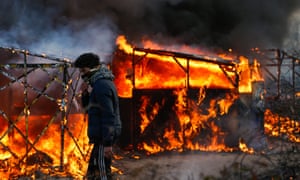Asylum: up to 400 refugee children stuck in France, lawyers say
Bar’s human rights committee says the children’s asylum applications have not had proper decisions and condemns government’s limits on Dubs scheme
 Shelters at the Calais refugee camp ablaze at the start of the clearing operation. Photograph: Laurent Dubrule/EPA
Shelters at the Calais refugee camp ablaze at the start of the clearing operation. Photograph: Laurent Dubrule/EPA
Owen Bowcott Legal affairs correspondent
Hundreds of unaccompanied children claiming to have relatives in Britain are stranded in France where their asylum cases are not being actively considered, senior human rights lawyers have said.
A study by the human rights committee of the bar (BHRC), released a year after the demolition of the Calais refugee camp, warns that as many as 400 children are trapped in France and are still vulnerable to trafficking, abuse and disease.
The allegations that asylum applications are not being properly considered is disputed by the Home Office, which points to six alternative legal routes by which children can still enter the UK.
These include the Syrian vulnerable persons resettlement scheme and refugee family reunion programmes. More than 900 unaccompanied, asylum-seeking children were allowed into the UK from Europe in 2016, according to the Home Office, which insists that it works closely with EU states on applications.
Barristers from the committee were among a small number of legal observers present when shacks and temporary accommodation on the site were dismantled by the French authorities at the end of October last year.
“Children were subjected to a chaotic and unlawful age verification and registration process, based in many cases on physical appearance alone,” the report by Kirsty Brimelow QC and Jelia Sane, who were in the camp, says. “The methods employed by officials were arbitrary and discriminatory.”
Advertisement
“[The committee] has learned that family reunion cases under Dublin III [EU asylum regulations] were poorly handled such that an estimated 400 unaccompanied minors claiming to have relatives in the UK are now stranded in France having had no proper decisions on their cases.”
Children refused asylum at the time were not given an opportunity to challenge age assessments which put them over the age of 18, the barristers maintain, a failure compounded by restrictions imposed by French officials on lawyers giving advice.
Two officials from the organisation France Terre D’Asile, which conducted assessments on teenage migrants in Calais, resigned in protest and were “appalled at what they had witnessed”, the report says.

Guardian Today: the headlines, the analysis, the debate - sent direct to you
Read more
“They reported that even children who had identity documents were being expelled from the queue if their appearance did not fit,” according to the barristers.
“The delegation heard reports that guidelines which should have been followed were severely curtailed or ignored due to lack of time. This resulted in adults being assessed as children and vice versa.”
Unaccompanied migrant children are living in overcrowded and squalid conditions across the EU, Brimelow and Sane point out. “Children are often found in emergency accommodation such as hotels or schools with no reliable access to food, water, sanitation, official information or any form of legal advice.
“Others sleep in car parks, train stations, hospital waiting rooms or on the streets. At borders, in ‘hotspots’ and in camps, children regularly witness violence or are subjected to violence themselves. An increase in numbers has meant that any child-specific facilities that do exist now are overstretched.”
The BHRC condemns the government’s decision to impose a limit on the number of children let into the UK under the emergency Dubs scheme.

Why has the UK ended its 'Dubs' child refugee scheme?
Read more
Although the UK government claimed to be responding to limited capacity among local authorities, the report states, a number of councils suggested they had surplus capacity but have not been asked to take any children.
Brimelow, chair of the BHRC, said: “The unaccompanied children of Calais have faced horror, both in their home countries and in France, in the “Jungle” camp. Nearly a year later, the horror continues as children remain vulnerable to trafficking, abuse, starvation and disease. These children bear silent witness to the failure that was the demolition of the camp. They are the exclamation marks that should litter this report.
Advertisement
“The UK and French authorities have an obligation under national and international law to act in the best interest of these children – to ensure their safety and security, to provide a place for them to sleep and to live, and to give them an opportunity to be children again. The UK government must lift the arbitrary cut-off date for applications from unaccompanied children and increase the number of children it will accept under the Dubs amendment.”
A Home Office spokesperson said: “The UK has a proud history of hosting, supporting and protecting those in need, including some of the most vulnerable children affected by the migration crisis. In 2016, the UK granted asylum or another form of leave to over 8,000 children and more than 42,000 children since 2010.
“At the request of the French government, the UK put in place an expedited process, which resulted in over 750 unaccompanied children being transferred to the UK in the autumn of 2016.
“We continue to work closely with the French authorities to transfer eligible children here quickly and safely under the Dublin regulation.”A
www.fotavgeia.blogspot.com
Bar’s human rights committee says the children’s asylum applications have not had proper decisions and condemns government’s limits on Dubs scheme
 Shelters at the Calais refugee camp ablaze at the start of the clearing operation. Photograph: Laurent Dubrule/EPA
Shelters at the Calais refugee camp ablaze at the start of the clearing operation. Photograph: Laurent Dubrule/EPAOwen Bowcott Legal affairs correspondent
Hundreds of unaccompanied children claiming to have relatives in Britain are stranded in France where their asylum cases are not being actively considered, senior human rights lawyers have said.
A study by the human rights committee of the bar (BHRC), released a year after the demolition of the Calais refugee camp, warns that as many as 400 children are trapped in France and are still vulnerable to trafficking, abuse and disease.
The allegations that asylum applications are not being properly considered is disputed by the Home Office, which points to six alternative legal routes by which children can still enter the UK.
These include the Syrian vulnerable persons resettlement scheme and refugee family reunion programmes. More than 900 unaccompanied, asylum-seeking children were allowed into the UK from Europe in 2016, according to the Home Office, which insists that it works closely with EU states on applications.
Barristers from the committee were among a small number of legal observers present when shacks and temporary accommodation on the site were dismantled by the French authorities at the end of October last year.
“Children were subjected to a chaotic and unlawful age verification and registration process, based in many cases on physical appearance alone,” the report by Kirsty Brimelow QC and Jelia Sane, who were in the camp, says. “The methods employed by officials were arbitrary and discriminatory.”
Advertisement
“[The committee] has learned that family reunion cases under Dublin III [EU asylum regulations] were poorly handled such that an estimated 400 unaccompanied minors claiming to have relatives in the UK are now stranded in France having had no proper decisions on their cases.”
Children refused asylum at the time were not given an opportunity to challenge age assessments which put them over the age of 18, the barristers maintain, a failure compounded by restrictions imposed by French officials on lawyers giving advice.
Two officials from the organisation France Terre D’Asile, which conducted assessments on teenage migrants in Calais, resigned in protest and were “appalled at what they had witnessed”, the report says.

Guardian Today: the headlines, the analysis, the debate - sent direct to you
Read more
“They reported that even children who had identity documents were being expelled from the queue if their appearance did not fit,” according to the barristers.
“The delegation heard reports that guidelines which should have been followed were severely curtailed or ignored due to lack of time. This resulted in adults being assessed as children and vice versa.”
Unaccompanied migrant children are living in overcrowded and squalid conditions across the EU, Brimelow and Sane point out. “Children are often found in emergency accommodation such as hotels or schools with no reliable access to food, water, sanitation, official information or any form of legal advice.
“Others sleep in car parks, train stations, hospital waiting rooms or on the streets. At borders, in ‘hotspots’ and in camps, children regularly witness violence or are subjected to violence themselves. An increase in numbers has meant that any child-specific facilities that do exist now are overstretched.”
The BHRC condemns the government’s decision to impose a limit on the number of children let into the UK under the emergency Dubs scheme.

Why has the UK ended its 'Dubs' child refugee scheme?
Read more
Although the UK government claimed to be responding to limited capacity among local authorities, the report states, a number of councils suggested they had surplus capacity but have not been asked to take any children.
Brimelow, chair of the BHRC, said: “The unaccompanied children of Calais have faced horror, both in their home countries and in France, in the “Jungle” camp. Nearly a year later, the horror continues as children remain vulnerable to trafficking, abuse, starvation and disease. These children bear silent witness to the failure that was the demolition of the camp. They are the exclamation marks that should litter this report.
Advertisement
“The UK and French authorities have an obligation under national and international law to act in the best interest of these children – to ensure their safety and security, to provide a place for them to sleep and to live, and to give them an opportunity to be children again. The UK government must lift the arbitrary cut-off date for applications from unaccompanied children and increase the number of children it will accept under the Dubs amendment.”
A Home Office spokesperson said: “The UK has a proud history of hosting, supporting and protecting those in need, including some of the most vulnerable children affected by the migration crisis. In 2016, the UK granted asylum or another form of leave to over 8,000 children and more than 42,000 children since 2010.
“At the request of the French government, the UK put in place an expedited process, which resulted in over 750 unaccompanied children being transferred to the UK in the autumn of 2016.
“We continue to work closely with the French authorities to transfer eligible children here quickly and safely under the Dublin regulation.”A
www.fotavgeia.blogspot.com

Δεν υπάρχουν σχόλια:
Δημοσίευση σχολίου